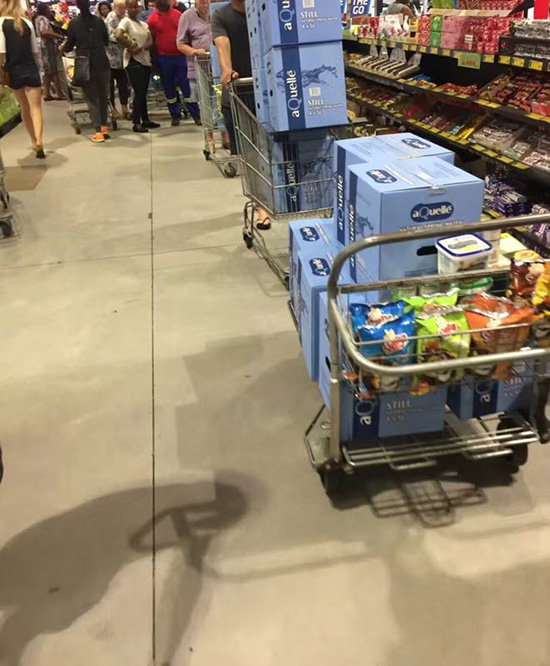


Cape Town residents head for supermarket to stock water. Photo: Zhong Ying
Johannesburg (People's Daily) - Victims of the El Nino climate phenomenon have nothing on those living in Cape Town, a city that is well on its way to becoming the first major metropolis in the world to ever run out of water.
As "Day Zero” approaches, which might happen mid-April depending on the calculation, a countdown has been launched and restrictions are in place.
The exact date in April remains unknown, but one thing is certain, Cape Town’s "Day Zero,” the moment when not a single drop of water will flow from the taps, is unavoidable.
On January 17, the Mayor of Cape Town, Patricia de Lille said, "There are still people who think that the day will not happen, and that the seven projects of the city that will allow us to increase our resources by 200 million liters a day will be enough to save us, but it's not the case. And even if these programs will make us more resilient to future shortages, they will not prevent us this time."
The drought that has engulfed Southern Africa for three years was aggravated by El Niño. As a result, the city’s groundwater supply has almost run dry. To make matters worse, rain isn’t expected for least four months.
Right now, there are many families without a water supply. When people’s needs surpass their water supply, they have to stand in line out in the street just to get more.
But the crisis also highlights inequality in South Africa. The wealthy have already cleaned out the city’s supermarket shelves.
Rich households pretend they’ve had to tighten their belts by not watering their gardens or filling their backyard pools with municipal water. Meanwhile, about 25 percent of Cape Town residents live on informal settlements. These people are forced to get their water from communal taps.
In a city of four million, at least one million Cape Town residents use only 4.5 percent of the city’s water.
The example here shows how the poorest people are the most affected when water is turned into a rare resource.
In order to extend the "Day Zero" deadline, a city council meeting was held on January 19. By the end of the meeting, water measures limiting consumption had been established. The daily limit per person was set at 50 liters (13.2 gallons) and 6,000 liters (1,585 gallons) per month for a family of four.
The limitations, which are accompanied by a significant increase in tariffs - from 4.56 to 29.93 rand (0.38 to 2.48 USD) up to 6,000 liters - went into effect on February 1.
Irrigating with municipal water is prohibited, as well as filling pools or washing cars, whether privately or for business.
The city has distributed guides to remind residents of the bans and encourage them to behave responsibly.
Residents have also been encouraged to flush their toilets using a bucket filled with sewage or rainwater rather than using tap water.
 Fire brigade in Shanghai holds group wedding
Fire brigade in Shanghai holds group wedding Tourists enjoy ice sculptures in Datan Town, north China
Tourists enjoy ice sculptures in Datan Town, north China Sunset scenery of Dayan Pagoda in Xi'an
Sunset scenery of Dayan Pagoda in Xi'an Tourists have fun at scenic spot in Nanlong Town, NW China
Tourists have fun at scenic spot in Nanlong Town, NW China Harbin attracts tourists by making best use of ice in winter
Harbin attracts tourists by making best use of ice in winter In pics: FIS Alpine Ski Women's World Cup Slalom
In pics: FIS Alpine Ski Women's World Cup Slalom Black-necked cranes rest at reservoir in Lhunzhub County, Lhasa
Black-necked cranes rest at reservoir in Lhunzhub County, Lhasa China's FAST telescope will be available to foreign scientists in April
China's FAST telescope will be available to foreign scientists in April "She power" plays indispensable role in poverty alleviation
"She power" plays indispensable role in poverty alleviation Top 10 world news events of People's Daily in 2020
Top 10 world news events of People's Daily in 2020 Top 10 China news events of People's Daily in 2020
Top 10 China news events of People's Daily in 2020 Top 10 media buzzwords of 2020
Top 10 media buzzwords of 2020 Year-ender:10 major tourism stories of 2020
Year-ender:10 major tourism stories of 2020 No interference in Venezuelan issues
No interference in Venezuelan issues
 Biz prepares for trade spat
Biz prepares for trade spat
 Broadcasting Continent
Broadcasting Continent Australia wins Chinese CEOs as US loses
Australia wins Chinese CEOs as US loses